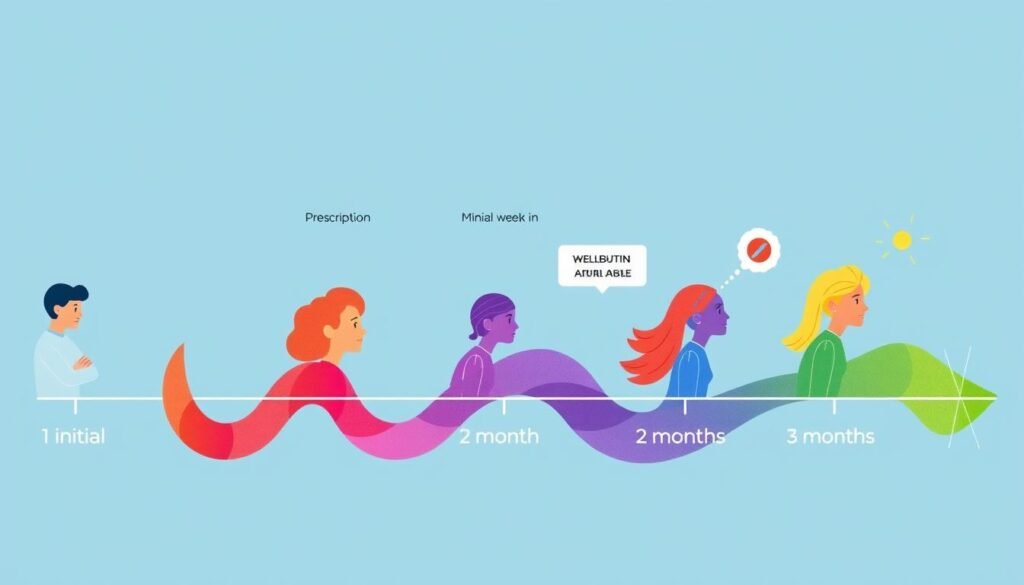Every year, 40 million adults in the United States deal with anxiety disorders. This shows a large need for effective treatments. Wellbutrin, or bupropion, is one such medication gaining popularity. It’s not only good for treating depression and seasonal blues but might also ease anxiety.
Unlike common antidepressants, Wellbutrin affects dopamine and norepinephrine. This makes it a possible option for those who haven’t had luck with other treatments. We’ll look into how Wellbutrin could be used for anxiety, its side effects, and other mental health support methods.
Key Takeaways
- Wellbutrin is FDA-approved for managing major depressive disorder and seasonal affective disorder.
- Research indicates Wellbutrin may be beneficial for treating generalized anxiety disorder when other medications fail.
- Initial improvements may be observed within two weeks, with full effects taking up to six weeks or longer.
- Common side effects include insomnia, dry mouth, and nausea, while serious risks necessitate caution.
- Other treatment options, like TMS therapy, offer non-pharmacological alternatives for managing anxiety.
Understanding Wellbutrin
Wellbutrin is the fourth most prescribed antidepressant in the U.S. It’s different because it can help lift your mood. People choose Wellbutrin for help with major depressive disorder (MDD) and seasonal affective disorder (SAD). Understanding how it works in your brain shows why it might be right for you.
What is Wellbutrin?
Wellbutrin treats depression differently from other antidepressants. It doesn’t just work on serotonin. Instead, it affects norepinephrine and dopamine. These chemicals are crucial for feeling motivated and happy. Its unique method makes it a choice for people who don’t do well with other types.
How Wellbutrin (Bupropion) Works
Wellbutrin boosts mood and energy by affecting certain brain chemicals. It stops norepinephrine and dopamine from being reabsorbed too quickly. This can make you feel better faster than many other antidepressants.
About 1 in 10 people on antidepressants feel more anxious. Wellbutrin might help with depression-driven anxiety. It’s good for lifting your mood and easing symptoms. If you’re handling both depression and anxiety, Wellbutrin could be worth considering.
Wellbutrin’s FDA-Approved Uses
Wellbutrin, also known as bupropion, is a powerful medicine. It’s mainly for fighting depression and similar issues. Its special mix helps people with Major Depressive Disorder (MDD) and Seasonal Affective Disorder (SAD).
Major Depressive Disorder (MDD)
Major Depressive Disorder shows up as a lasting sad mood and loss of interest in daily life. It comes with both physical and emotional symptoms that really affect a person’s life. Wellbutrin is unique because it focuses on norepinephrine and dopamine, enhancing mood without the usual side effects of other antidepressants.
Its success in treating MDD makes it a key part of treatment plans for depression.
Seasonal Affective Disorder (SAD)
Seasonal Affective Disorder triggers depression at certain times of the year, like the winter. Wellbutrin’s active effects offer an effective treatment for SAD. It’s a good choice for those seeking an energetizing alternative to the usual SSRIs, which can make you feel more tired.
Although Wellbutrin is mainly for depression, it’s vital to talk to health experts to customize your treatment. For deeper insights into Wellbutrin for managing anxiety and other uses, visit discussions on off-label uses.
What is Wellbutrin and How Does It Help Anxiety?
Wellbutrin, also known as bupropion, is used to treat depression and seasonal affective disorder. It’s also used off-label for anxiety relief. People who don’t benefit from common antidepressants might try Wellbutrin. It offers an alternative without the typical side effects of other drugs.
Off-Label Use for Anxiety
Using Wellbutrin for anxiety has shown promise. Only 2 percent stopped using it because of anxiety-related side effects. One study with a 150 mg daily dose noted a major decrease in panic and anxiety. Furthermore, Wellbutrin XL was as effective as escitalopram for generalized anxiety disorder. This finding suggests more treatment options for those with anxiety.
Wellbutrin’s Mechanism in Treating Anxiety
Wellbutrin works differently by targeting norepinephrine and dopamine. This approach helps treat anxiety without causing sedation. It boosts energy and focus, fighting off fatigue and disinterest that often come with anxiety. Patients should watch for possible side effects like restlessness or insomnia. It’s crucial to stick to the prescribed dose to avoid risks like seizures.
| Dosage Form | Starting Dosage | Primary Action |
|---|---|---|
| Wellbutrin SR (Sustained Release) | 100 mg to 200 mg, twice daily | Dopamine and norepinephrine reuptake inhibitor |
| Wellbutrin XL (Extended Release) | 150 mg or 300 mg, once daily | Dopamine and norepinephrine reuptake inhibitor |
Understanding Anxiety Disorders
Anxiety disorders include different types of intense fear and worry. Knowing about these disorders and spotting their signs is key to dealing with them effectively. Ignoring these signs can make everyday life tougher and harm your well-being.
Symptoms of Anxiety
Everyone experiences anxiety differently, but there are common symptoms:
- Rapid heartbeat
- Excessive sweating
- Restlessness or feeling on edge
- Difficulty concentrating
- Increased irritability
- Muscle tension
It’s important to know these signs to spot anxiety disorders early. Getting help soon can help people manage their symptoms better.
Impact of Anxiety on Daily Life
Anxiety can greatly change day-to-day life. It can hurt job performance, harm social life, and lower quality of life. Some people might avoid places or situations that make their anxiety worse, leading to feeling more alone.
Getting help for anxiety is critical. It helps people handle their condition and improves their day-to-day activities. Tackling anxiety allows people to engage more fully with life around them.

| Common Symptoms | Physical Symptoms | Emotional Symptoms |
|---|---|---|
| Rapid heartbeat | Increased sweating | Restlessness |
| Trembling | Feeling tired | Easily startled |
| Dry mouth | Muscle tension | Difficulties in focusing |
Is Wellbutrin Effective for Anxiety Treatment?
To understand Wellbutrin’s role in treating anxiety, we look at current research and compare it with other meds. Though not many studies focus solely on Wellbutrin for anxiety, some evidence points to its benefits for certain folks.
Research Findings and Studies
A few studies on Wellbutrin (bupropion) show it helps with Generalized Anxiety Disorder (GAD). It’s useful for those who didn’t do well on other antidepressants. As a norepinephrine-dopamine reuptake inhibitor (NDRI), it works differently than others.
This difference makes Wellbutrin attractive for people wanting fewer side effects. Many choose it to avoid problems like gaining weight or sexual dysfunction seen with other treatments.
Comparison with Other Antidepressants
Wellbutrin is as good as other antidepressants in easing anxiety, studies say. A 2023 study in the Journal of Clinical Psychopharmacology found it matched SSRIs in reducing anxiety.
It’s less likely to make people feel tired or cause sexual issues. About 2% stopped taking Wellbutrin because of side effects. Yet, most patients noted it eased their anxiety symptoms.
How Long Does Wellbutrin Take to Work for Anxiety?
Knowing when Wellbutrin starts working for anxiety is key for users. People respond differently when they start treatment. Usually, signs of improvement appear in the first two weeks. Early success can be uplifting, but experiences vary greatly.
Initial Phases of Treatment
At the start, users of Wellbutrin might feel slight improvements. These can include a better mood and more focus. Doctors stress staying in touch to monitor symptoms and adjust doses if needed. Keeping up with feedback helps tailor the treatment to each person’s needs.
Full Therapeutic Effects Timeline
It could take four to six weeks to feel Wellbutrin’s full effect. The dose, health history, and other conditions affect when benefits peak. Users generally notice improved sleep and more energy. If there’s no big improvement, talking to a doctor about other options is important.

| Time Frame | Expected Effects |
|---|---|
| 1-2 Weeks | Initial symptom improvements such as mood enhancement and increased focus. |
| 4-6 Weeks | Full therapeutic effects with improved mood, energy levels, and overall quality of life. |
| Beyond 6 Weeks | Assessment of treatment effectiveness; potential dosage adjustments or changes in medication. |
Common Side Effects of Wellbutrin
Understanding Wellbutrin’s common and serious side effects is key. This knowledge helps patients manage their treatment better.
Common and Mild Side Effects
Common side effects of Wellbutrin are often mild and easy to handle. Here are some examples:
- Insomnia
- Dry mouth
- Nausea
- Headaches
- Dizziness
- Loss of appetite
These effects usually fade as your body gets used to the drug. Patients like that Wellbutrin doesn’t have the heavy side effects seen in other antidepressants. This includes big weight gain or sexual problems.
Serious Side Effects and Risks
Wellbutrin is mostly safe, but it has some serious side effects of Wellbutrin to watch out for. Keep an eye on these risks:
- Seizures
- Suicidal thoughts or tendencies
- Severe allergic reactions, including anaphylaxis
- Serious skin reactions, like Stevens-Johnson syndrome
- High blood pressure, potentially resulting in headaches or dizziness
- Changes in vision or eye pain
If you notice any strange symptoms, telling your doctor right away is important. The possibility of these risks should be considered when thinking about Wellbutrin’s overall risks.
Having regular talks with your healthcare team is critical. This ensures any serious side effects are caught early on.
Alternatives to Wellbutrin for Anxiety Treatment
People often look at alternatives to Wellbutrin when they need to manage anxiety. SSRIs and SNRIs are common first choices. Buspirone, also called Buspar, is getting noticed for its high effectiveness. It has fewer side effects than old-school benzos. Learning about these options lets patients find what works best for them.
Other Medications for Anxiety Treatment
There are many anxiety medications available, each with its own effects and side effects. Here’s a quick look at some of them:
| Medication | Type | Primary Action | Typical Cost |
|---|---|---|---|
| Wellbutrin (bupropion) | Atypical Antidepressant | Norepinephrine and dopamine reuptake inhibition | $17 for 30 tablets |
| Buspar (buspirone) | Anxiolytic | Acts on Serotonin receptors | $12 for 30 tablets |
| Lexapro (escitalopram) | SSRI | Inhibits serotonin reuptake | Price varies with dosage |
Buspar is approved by the FDA for anxiety and works well without the addiction risk of benzos. The right anxiety medication choice should be discussed with a doctor. They consider your particular health needs.
Non-Pharmacological Options
Many people also try non-pharmacological anxiety options along with drugs. These methods can make your treatment work better:
- Cognitive-Behavioral Therapy (CBT)
- Mindfulness and meditation
- Regular physical activity
- Diet and lifestyle changes
CBT therapy helps folks understand what causes their anxiety and how to deal with those triggers. Mindfulness and working out offer big benefits too. When you mix meds with these non-pharmacological options, you often see the best outcomes for your mental health.

Considerations Before Starting Wellbutrin
Before starting Wellbutrin, it’s crucial to have a deep talk with healthcare experts. This talk should go over your medical past, current meds, and any health issues you have. Working together lets you identify possible risks, creating a plan that is both safe and effective for handling anxiety.
Consultation with Healthcare Providers
Healthcare providers are key in figuring out the best treatment for you. With many adults in the U.S. battling anxiety, it’s important to look at all treatment options, not just Wellbutrin. Your provider will check your mental health closely and might suggest other treatments or therapies that could work better for you.
Individualized Treatment Plans
Creating a treatment plan that’s just for you is critical. This plan could mix different meds and therapies with changes in how you live. This well-rounded approach is crucial for tackling both anxiety and any other issues you might be dealing with.
| Component | Details |
|---|---|
| Consultation Importance | Ensures assessment of medical history and potential risks. |
| Healthcare Provider Role | Provides guidance on suitable treatments for anxiety. |
| Treatment Approach | May include medications, therapies, and lifestyle changes. |
| Patient-Centric Care | Focuses on unique needs leading to effective anxiety management. |
Conclusion
Wellbutrin offers hope for those looking for anxiety relief, especially if other antidepressants haven’t worked. It’s known for helping with depression and seasonal sadness. But now, it seems it can also help with anxiety. By affecting norepinephrine and dopamine, it presents a new option for anxiety treatment.
A study has shown that Wellbutrin can work as well as SSRIs for anxiety. This challenges the old view that it wasn’t good for anxiety. It means Wellbutrin could be part of mental health care, offering a new choice for those with anxiety. For deeper insight, see the study on Wellbutrin’s effects.
More research is lighting up the path for Wellbutrin in treating anxiety. It’s key for patients to talk with their doctors about it as an option. With a tailored care plan, Wellbutrin might help improve mental health significantly.